Ah, the iconic quote from George W. Bush: 'I hear there's rumors on the internets.' Imagine the Wild West, but with Wi-Fi! Bush's Texan twang added a touch of down-home charm to internet musings. Those rumors? They spread faster than a cat video on social media. The online world became a playground for gossip and theories, with memes and jokes swirling faster than you can say 'unsubscribe.' So, buckle up and get ready to uncover how Bush's words sparked a digital wildfire of chatter and speculation.
Background of the 2004 Debate
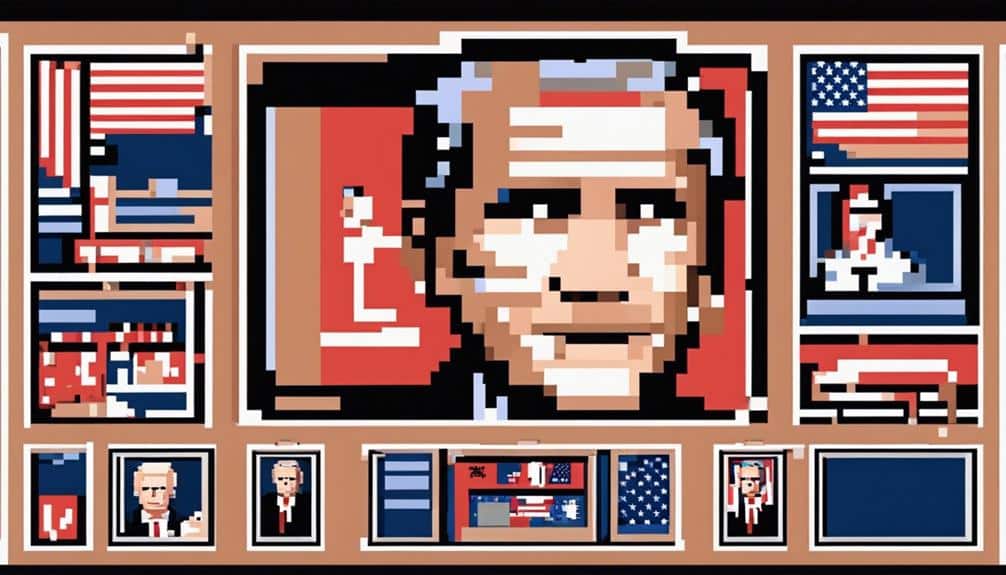
Explore the origins of the 2004 debate to understand the context of the rumors circulating on the internets. Ah, the year 2004 – a time when flip phones reigned supreme, and MySpace profiles were the epitome of social networking. Back then, George W. Bush graced us with his wisdom, famously declaring, 'I hear there's rumors on the internets.' Yes, you read that right, 'internets' with an 's' – because one internet just wasn't enough for the former president.
During the 2004 presidential debates, Bush's quirky communication style left audiences scratching their heads and internet users abuzz with speculation. His unique way with words and penchant for creating new plural forms of familiar terms sparked a wave of memes and jokes that are still circulating to this day.
From 'strategery' to 'misunderestimate,' Bush's linguistic innovations continue to entertain and perplex the masses.
Bush's Communication Style
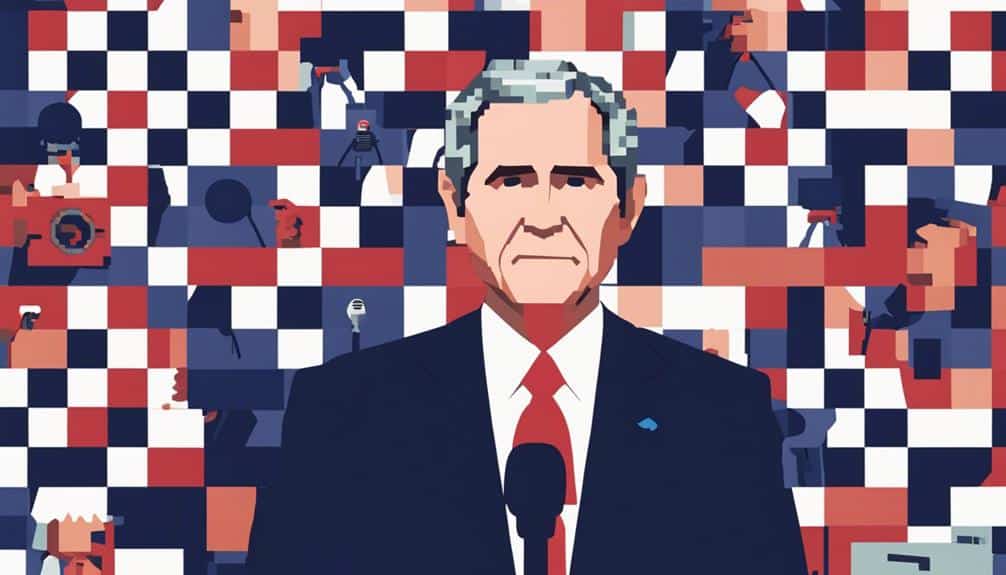
Bush's communication style during the 2004 debates captivated audiences and sparked online discussions due to his unconventional language choices and distinctive manner of expression. Here are four reasons why his unique way of speaking left a lasting impression:
- Quirky Phrases:
Bush's tendency to coin quirky phrases like 'strategery' and 'misunderestimated' left viewers both amused and perplexed, adding a touch of unexpected humor to the serious political arena.
- Texan Twang:
His strong Texan accent and folksy expressions gave him a relatable charm, making him appear like the friendly neighbor next door rather than a formidable political figure.
- Simplistic Soundbites:
Bush's preference for simplistic soundbites over complex policy explanations made it easy for the average viewer to grasp his message, even if it lacked depth.
- Confidence in Conviction:
Despite linguistic slip-ups, Bush's unwavering confidence in his convictions projected a sense of certainty, whether the audience agreed with him or not.
Internet's Role in Politics
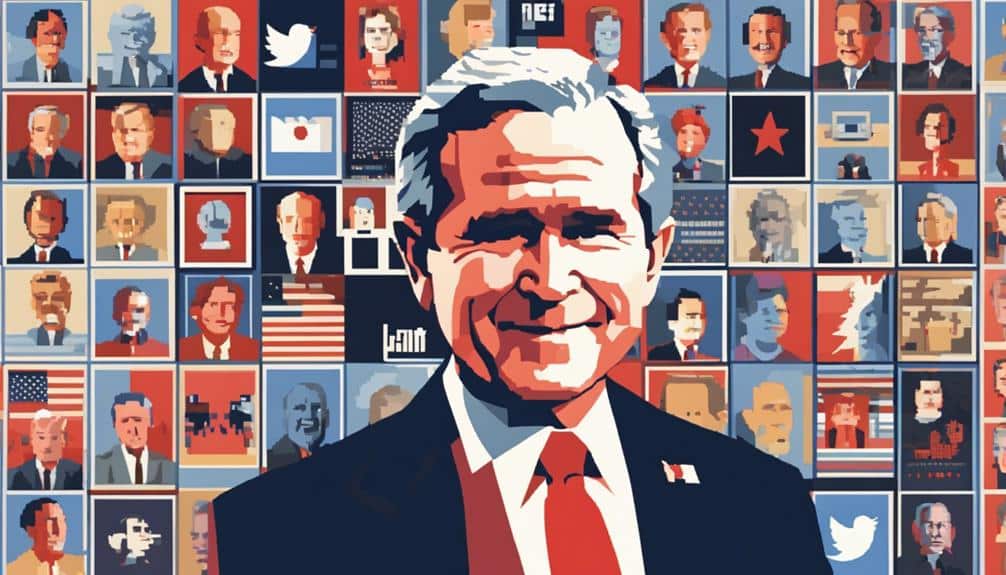
The internet has revolutionized the political scene by providing a platform for real-time information sharing and grassroots activism. Gone are the days of waiting for the newspaper to arrive on your doorstep; now, you can refresh your feed and get the latest on political scandals faster than you can say 'fake news.'
Social media platforms have become battlegrounds for political debates, where keyboard warriors wield memes and hashtags like swords in a digital joust. Politicians are no longer just faces on TV screens; they now have Twitter fingers that can ignite a firestorm with a single tweet.
Campaigns harness the power of online fundraising, reaching donors from all corners of the globe with just a click of a button. The internet has turned every citizen into a potential political pundit, with blogs and vlogs offering hot takes on everything from healthcare reform to the latest White House gaffe.
Public Perception of Bush
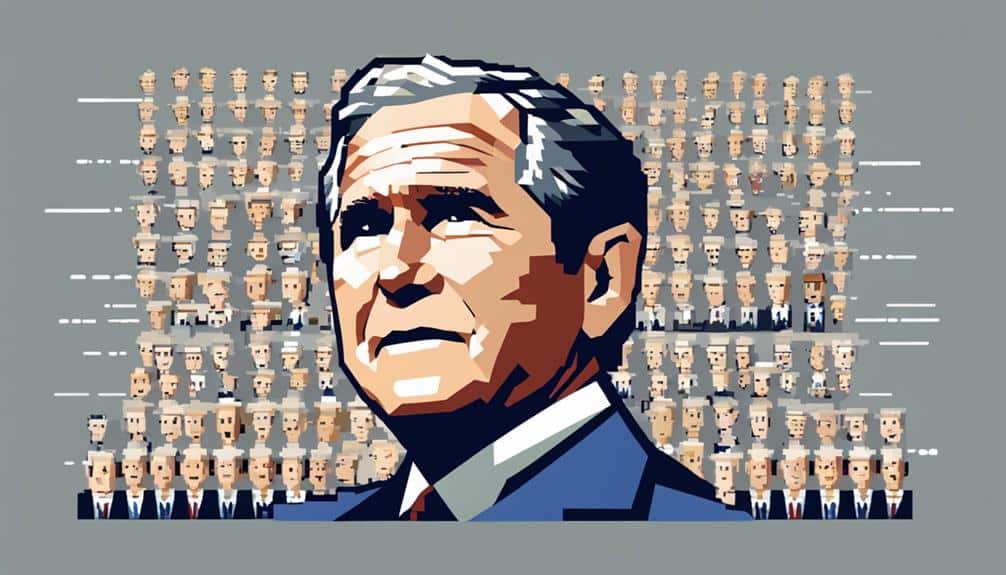
Public perception of Bush varies widely depending on the generation you ask. Baby boomers might still remember his cowboy charisma, while millennials often associate him with questionable foreign policies. Here are a few ways people view the former president:
- Nostalgia: Some older individuals fondly recall Bush's leadership, reminiscing about a simpler time when politics seemed less chaotic.
- Criticism: Younger generations often criticize Bush for his handling of the Iraq War and the 2008 financial crisis, viewing him as a symbol of government missteps.
- Memes: The internet is flooded with memes mocking Bush's famous gaffes and awkward moments, turning him into a pop culture punchline.
- Legacy: Bush's legacy remains a subject of debate, with supporters highlighting his efforts in education reform and detractors pointing to his administration's controversies.
Regardless of where you stand on the Bush spectrum, one thing is clear – his impact on American politics continues to spark conversations and debates across the board.
Memorable Bush Quotes
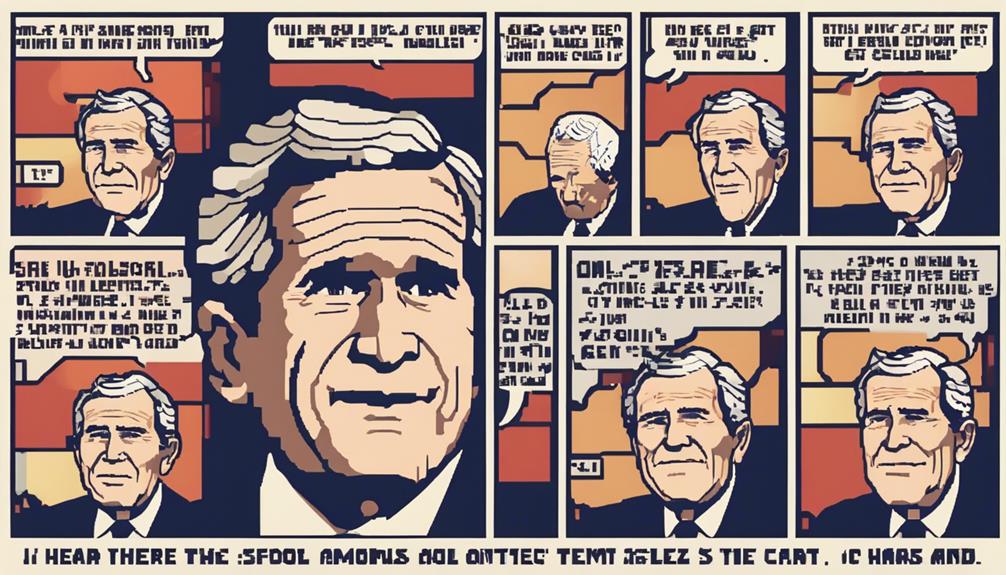
You might recall some of the memorable quotes attributed to the former president during his time in office. Who could forget the classic, 'I know the human being and fish can coexist peacefully'? A true visionary, Mr. Bush had a way with words that left us all scratching our heads.
And who can overlook the iconic, 'Rarely is the question asked: Is our children learning?' Ah, the eternal pondering of the education system's deepest mysteries.
But wait, there's more! How about the profound statement, 'I just want you to know that, when we talk about war, we're really talking about peace'? It's like a riddle wrapped in an enigma shrouded in confusion.
And let's not overlook the gem, 'Families is where our nation finds hope, where wings take dream.' A true wordsmith, inspiring poets and comedians alike.
In a world filled with ordinary quotes, George W. Bush's verbal masterpieces shine like a beacon of linguistic wonderment.
Impact on Technology Discourse
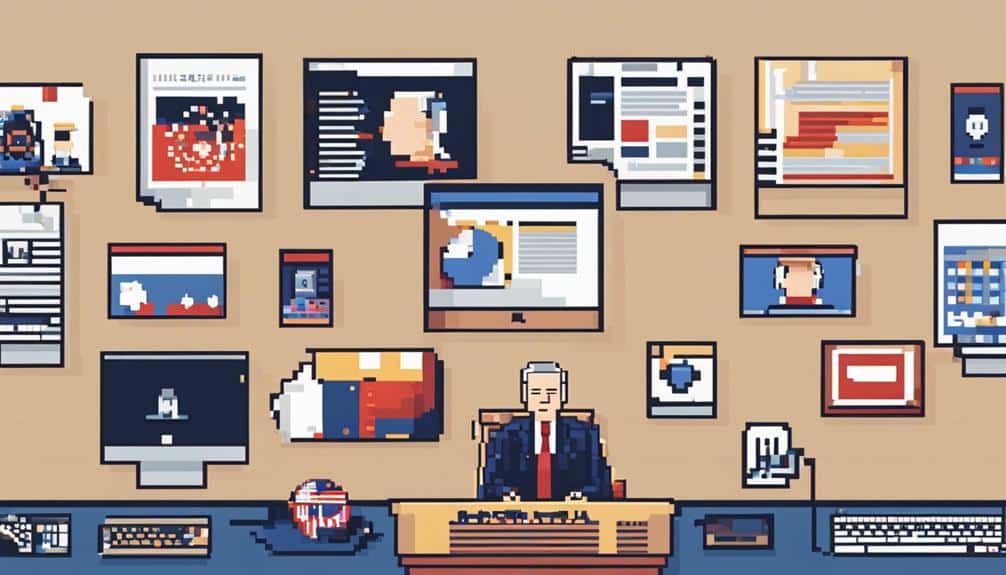
So, you like a good tech debate?
Brace yourself, as online misinformation is the Godzilla crashing through the digital literacy city.
It's like trying to navigate a minefield of fake news and tech jargon without a map or a compass.
And let's not forget the political undertones that make every tech discussion feel like a high-stakes chess game – just with more cat memes.
Online Misinformation Challenges
Exploring the terrain of online misinformation poses significant challenges to cultivating meaningful discussions within the domain of technology discourse. When traversing the digital landscape, you're bombarded with a barrage of fake news and conspiracy theories that make deciphering fact from fiction feel like finding a needle in a haystack. Here's a list of emotions you might experience:
- Frustration: Trying to untangle the web of lies can leave you feeling like you're trapped in a maze with no way out.
- Confusion: One moment you're reading about the latest tech breakthrough, and the next, you're down a rabbit hole of outlandish claims and doctored images.
- Skepticism: Trusting anything you read online becomes a Herculean task, making you question even the most innocuous-seeming articles.
- Amusement: Despite the chaos, there's a bizarre sense of entertainment in witnessing the wild stories people concoct online, like a never-ending sci-fi soap opera.
Digital Literacy Education
Exploring the domain of technology discourse requires a strong understanding of digital literacy education to distinguish truth from misinformation in the online environment. In today's digital age, where 'alternative facts' and 'fake news' run rampant, being able to navigate the vast sea of information is essential.
Digital literacy education equips you with the skills to critically evaluate online content, discern credible sources from dubious ones, and spot red flags that indicate potential misinformation.
Imagine scrolling through your social media feed and encountering a sensational headline claiming that eating a pineapple a day can make you immune to all diseases. Without digital literacy education, you might fall prey to such outlandish claims, spreading misinformation unknowingly.
However, armed with the right knowledge, you'd know to fact-check, verify sources, and approach such information with a healthy dose of skepticism.
Political Implications of Tech
Understanding the political implications of technology is essential for grasping its impact on shaping modern discourse. In a world where tweets carry weight equivalent to official statements, being tech-savvy is as vital as understanding traditional political maneuvers. Here are four ways tech mixes up the political pot:
- Filter Bubbles: Ever noticed how your news feed only shows you one side of the story? That's the tech algorithm playing puppet master, feeding you what you want to hear rather than what you need to know.
- Deepfakes: A politician's face on a dancing cat video? Welcome to the era of deepfakes, where reality and fiction dance a tango so intricate, even Sherlock would struggle to separate fact from fiction.
- Cyber Warfare: Forget handshakes; wars are now waged in the digital domain. From election interference to hacking scandals, the battlefield has shifted to servers and software.
- Influencer Politics: Move over, lobbyists. The new power players are influencers, shaping public opinion in 280 characters or less, with sponsored content to boot.
Humor in Political Communication
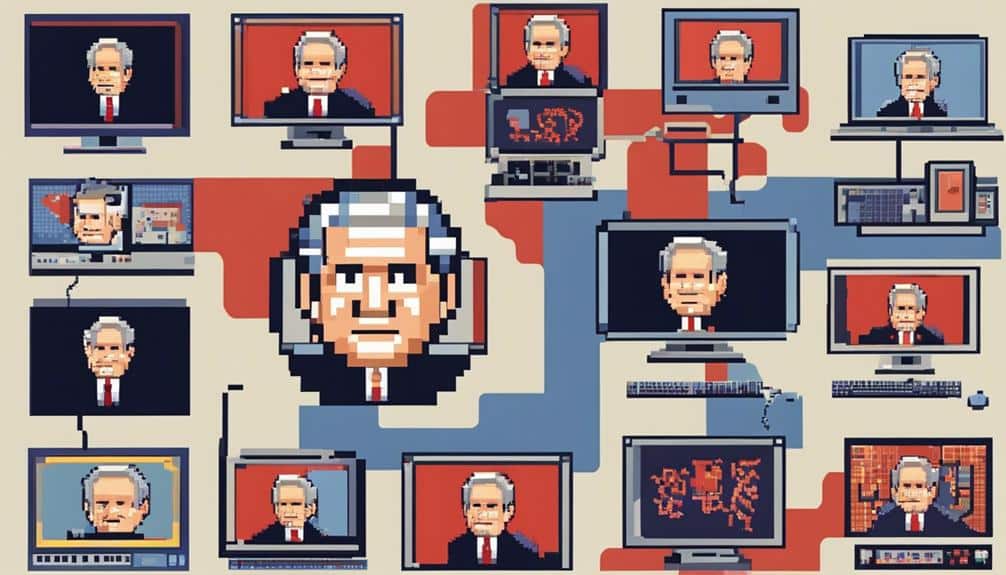
Humor plays a significant role in political communication, often used to engage and connect with audiences in a relatable and light-hearted manner. Politicians love cracking jokes almost as much as they love kissing babies – it's like a comedic campaign strategy.
From witty one-liners to well-timed puns, humor is the secret sauce that spices up those otherwise dry political speeches. It's like adding a dash of paprika to a bland dish, suddenly making it palatable and even enjoyable.
Picture this: a politician walks into a press conference, and instead of the usual serious rhetoric, they start with a hilarious anecdote that leaves the room in stitches. Instantly, the audience feels a connection, a bond formed through shared laughter.
It's the political version of a stand-up comedy show, with policies and punchlines intertwined for maximum impact.
Evolution of Online Rumors
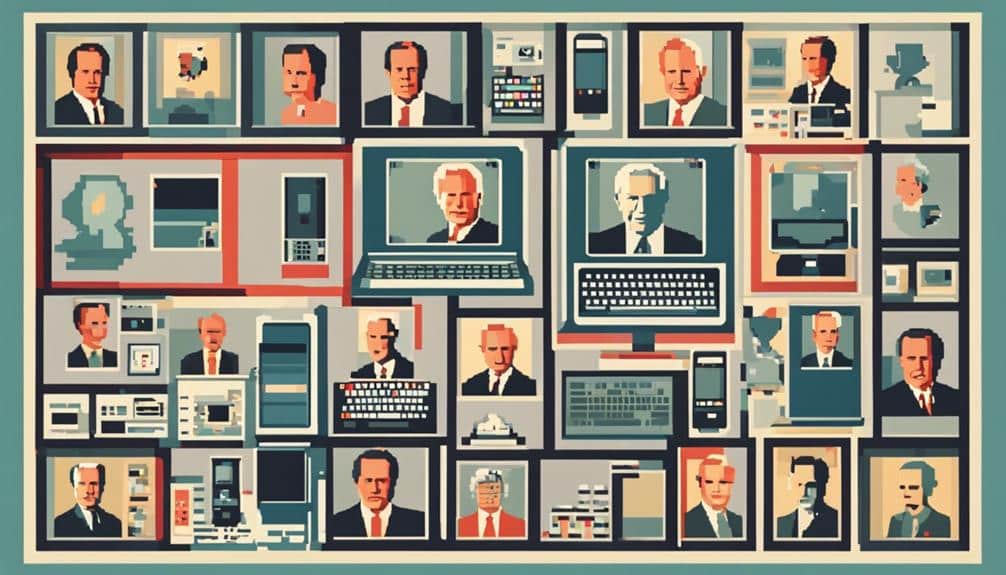
So, you think online rumors just magically appear out of thin air, huh?
Well, buckle up, because these stories have a way of sneaking into your feed and planting themselves like stubborn weeds.
From a harmless whisper to a full-blown viral sensation, the evolution of online rumors is like watching a game of telephone on steroids.
Origin of Online Rumors
Online rumors have evolved greatly over the years, transforming the way information spreads across the internet. From the early days of chain emails to today's viral social media posts, the origin of online rumors can be quite entertaining to explore. Here are some intriguing facets you might find amusing:
- The Dark Ages of Dial-Up: Picture this – a time when rumors traveled at the speed of a snail on a dial-up connection. Waiting for a webpage to load felt like watching paint dry, making spreading rumors a true test of patience.
- Anonymous Avatars: Ah, the mystery of the early internet where everyone lurked behind quirky usernames. Rumors spread like wildfire, often originating from shadowy figures hiding behind cryptic aliases.
- Forum Frenzy: Remember when forums were the hub of online discussions? Rumors ran rampant in these virtual gathering places, with threads exploding into heated debates over the wildest claims.
- Email Chain Madness: The era of forwarding emails promising riches if you sent them to 10 friends. Online rumors flourished in these digital epistles, spreading like a contagious meme through unsuspecting inboxes.
Spread Through Social Media
The rapid spread of online rumors through social media platforms has revolutionized the way information disseminates across the internet. Imagine a world where a single tweet can turn a small gossip into a full-blown conspiracy theory in a matter of minutes.
Social media has become the ultimate breeding ground for rumors, where a harmless comment can snowball into a trending topic faster than you can say 'fact-check.'
Platforms like Twitter and Facebook have made it easier than ever for rumors to spread like wildfire. With just a few clicks, a juicy piece of gossip can be shared, liked, and commented on by thousands, if not millions, of users.
The allure of being the first to break a scandal or reveal a shocking secret fuels the rapid dissemination of unverified information, creating a digital game of telephone where the truth often gets lost in translation.
Impact on Society
The evolution of online rumors has greatly impacted society, altering how information is consumed and perceived by the masses. With the rapid spread of fake news and unverified claims, the online rumor mill has become a breeding ground for chaos and confusion.
Here are four ways in which this evolution has influenced society:
- Distrust: Online rumors have fostered a culture of skepticism, where every headline is met with raised eyebrows and a healthy dose of doubt.
- Polarization: Rumors often fuel heated debates and divide communities, turning friends into foes over a mere clickbait headline.
- Information Overload: The constant bombardment of rumors has left society drowning in a sea of half-truths and fabrications, making it challenging to discern fact from fiction.
- Reputation Damage: Individuals and businesses alike have fallen victim to malicious online rumors, with their reputations tarnished in the blink of an eye.
In this digital age, navigating the treacherous waters of online rumors requires a keen eye and a healthy dose of skepticism.
Lessons for Modern Politicians
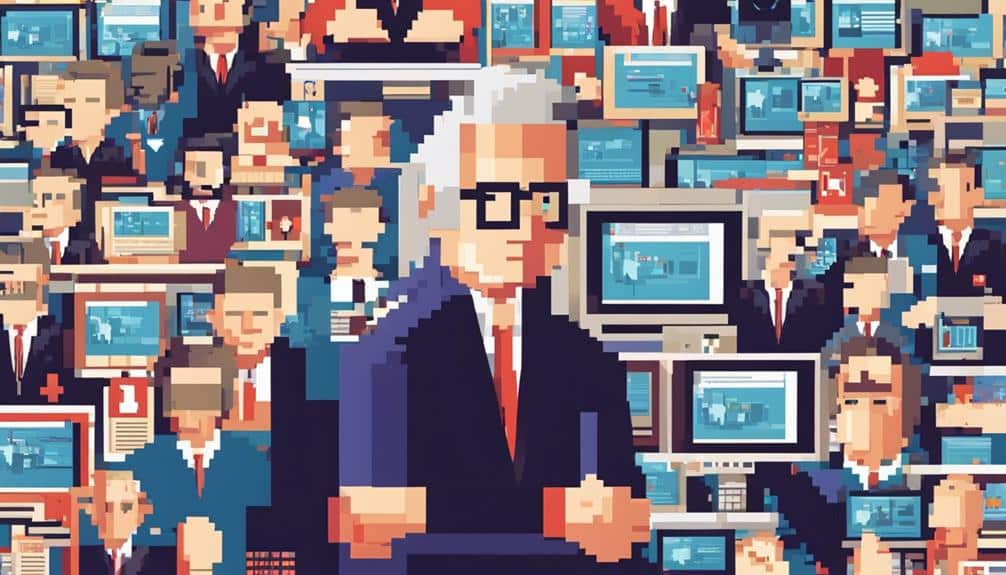
Politicians today must adapt to the fast-paced nature of information dissemination to effectively counter false rumors. In the age of the internet, where a simple click can make or break a reputation, you, dear modern politician, must navigate the treacherous waters of online gossip with finesse.
Gone are the days of whisper campaigns confined to smoky backrooms; now, rumors spread like wildfire on the digital frontier. To stay ahead of the game, you must master the art of swift response. No longer can you afford to wait days for a press release to address a scandal; by then, the internet has birthed a hundred memes mocking your inaction.
Embrace social media, be the first to debunk falsehoods, and show the world you're not just another politician caught in the web of deceit.
Conclusion
So, next time you're spreading rumors on the internets, just remember George W. Bush is listening. And who knows, maybe one day you'll be the star of a viral meme or the subject of a hilarious online rumor. Just make sure it's not about you thinking the internets are some kind of new invention.
Keep it classy, internet. And remember, the truth is out there…somewhere in the depths of those mysterious internets.
